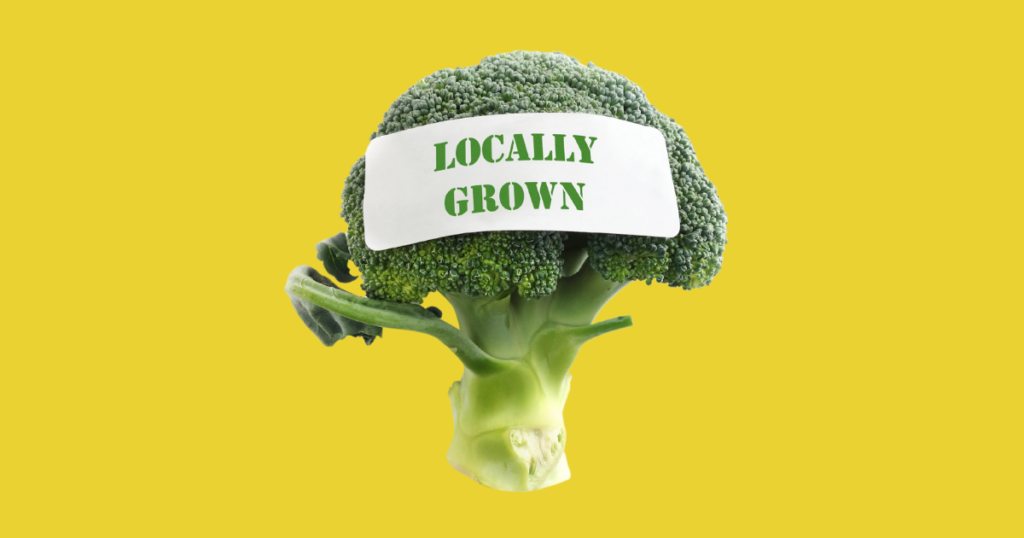
Locally and Seasonally – What Does that Mean When It Comes To Eating?
In today’s fast-paced world, where global supply chains dominate the food industry, the concept of eating locally and seasonally may seem like a nostalgic relic of the past. However, as concerns about environmental sustainability, food security, and personal health continue to mount, the importance of embracing local and seasonal eating practices has never been clearer. In this blog post, we’ll delve into the many reasons why eating locally and seasonally is not just a trendy fad, but a crucial component of a sustainable and healthy lifestyle.
In addition to its nutritional advantages, eating locally and seasonally fosters a deeper connection to food, community, and the natural world. By embracing the seasons and savoring the flavors of local cuisine, we can rediscover the joy of eating fresh, wholesome foods while supporting the farmers and producers who work tirelessly to feed our communities.
From reducing our environmental footprint and supporting local economies to promoting personal health and well-being, the benefits of embracing local and seasonal eating practices are manifold. In the following sections, we’ll explore practical tips for incorporating local and seasonal foods into your diet and share delicious recipes that celebrate the bounty of each season.

Understanding Local and Seasonal Eating
What does it mean to to eat locally and seasonally? Eating locally means sourcing food that is produced within a relatively close geographic radius, typically from nearby farms or producers. Similarly, eating seasonally involves consuming foods that are harvested at the peak of their ripeness and availability, aligning with the natural growing cycles of fruits, vegetables, and other crops.
One of the primary reasons why eating locally and seasonally is so important is its positive impact on the environment. By reducing the distance that food travels from farm to plate, we can significantly decrease the carbon emissions associated with transportation and distribution. Industrial agriculture, with its reliance on long-distance shipping and refrigeration, contributes to air pollution, habitat destruction, and greenhouse gas emissions. In contrast, supporting local farmers and producers helps minimize the carbon footprint of our food, fostering a more sustainable and eco-friendly food system. (Do you know your carbon footprint score? Click here, to find out).
Eating locally and seasonally promotes biodiversity and protects natural ecosystems. Local farmers often cultivate a diverse array of crops that are well-suited to the local climate and soil conditions, preserving genetic diversity and promoting resilient agricultural landscapes. By supporting local food systems, we can help safeguard endangered plant varieties, protect wildlife habitats, and maintain the ecological balance of our surroundings. Here are a few reasons environment-based reasons to love eating locally and seasonally:
Environmental Benefits of Local and Seasonal Eating
-
Reduced Carbon Footprint: One of the most significant environmental benefits of eating locally and seasonally is the reduction of carbon emissions associated with transportation. When food doesn’t have to travel long distances to reach your plate, it requires less fuel for transportation, resulting in lower greenhouse gas emissions. By supporting local farmers and purchasing seasonal produce, you’re helping to minimize the carbon footprint of your diet.
-
Preservation of Biodiversity: Eating locally encourages the preservation of biodiversity within a region. Local farmers often cultivate a wide variety of crops that are well-suited to the local climate and ecosystem. By supporting these farmers, you’re contributing to the preservation of diverse plant species and protecting the habitats of native wildlife.
-
Support for Local Agriculture: Choosing to eat locally strengthens the local economy and supports small-scale farmers. By purchasing directly from local farmers or through farmers’ markets, you’re investing in the livelihoods of individuals who are dedicated to sustainable agricultural practices. This support helps to maintain the agricultural landscape and prevent the conversion of farmland into non-agricultural uses.

Beyond its environmental benefits, eating locally and seasonally also has significant implications for personal health and well-being. Here are a few reasons health-based reasons to love eating locally and seasonally:
Health Benefits Eating Locally and Seasonally
-
Fresher, More Nutrient-Dense Foods: Locally grown produce is often harvested at peak ripeness and delivered to consumers soon after being picked. This means that fruits and vegetables retain more of their nutrients and flavor compared to those that have been shipped long distances and stored for extended periods. By eating fresh, locally sourced foods, you’re maximizing your intake of vitamins, minerals, and antioxidants essential for optimal health.
-
Reduced Exposure to Pesticides and Chemicals: Many local farmers prioritize organic and sustainable farming practices, which can result in lower pesticide and chemical usage compared to large-scale industrial agriculture. By choosing locally grown produce, you can reduce your exposure to harmful pesticides and chemicals often used in conventional farming. This can have positive effects on your overall health and well-being, as pesticide residues have been linked to various health issues.
-
Connection to the Seasons and the Land: Eating seasonally encourages a deeper connection to the natural world and the rhythms of the seasons. When you eat foods that are in season, you’re aligning your diet with the natural cycles of the Earth. This connection can foster a greater appreciation for the land, the changing seasons, and the importance of sustainable agriculture in maintaining ecological balance

5 Tips for Embracing Local and Seasonal Eating
-
Shop at Farmers’ Markets: Visit your local farmers’ market to discover a diverse array of fresh, seasonal produce directly from local farmers.
-
Join a Community Supported Agriculture (CSA) Program: Consider joining a CSA program, where you can receive a weekly or monthly box of seasonal produce from a local farm.
-
Grow Your Own Food: Start a garden at home to grow your own fruits, vegetables, and herbs, even if it’s just a small container garden on a balcony or windowsill.
-
Preserve Seasonal Foods: Take advantage of seasonal abundance by preserving fruits and vegetables through methods such as canning, freezing, or drying for future use.
-
Educate Yourself: Learn about the seasonal growing patterns in your region and familiarize yourself with what foods are in season at different times of the year.
Main Takeaways
The practice of eating locally and seasonally extends far beyond the confines of personal dietary choices; it embodies a holistic approach to nourishing both our bodies and the planet we call home. By embracing this mindful way of eating, individuals have the power to effect positive change on multiple fronts.
First and foremost, supporting local farmers and producers not only strengthens regional economies but also fosters a sense of community resilience. By choosing locally sourced foods, consumers directly contribute to the livelihoods of those who work tirelessly to cultivate the land and bring fresh, wholesome produce to market. This support not only ensures the viability of local agriculture but also helps preserve the cultural heritage and traditions that are deeply rooted in our food systems.
Moreover, the environmental benefits of eating locally and seasonally are profound. By reducing the distance that food travels from farm to table, we can significantly diminish the carbon footprint associated with transportation and distribution. This translates into lower emissions of greenhouse gases, reduced reliance on fossil fuels, and a smaller ecological footprint overall. By making conscious choices about the foods we consume, we can play a pivotal role in mitigating the effects of climate change and preserving the natural resources upon which all life depends.
On a personal level, embracing local and seasonal eating offers an opportunity to reconnect with the rhythms of nature and cultivate a deeper appreciation for the bounty of each season. From crisp apples in the fall to juicy tomatoes in the summer, seasonal foods delight the senses and nourish the body with an abundance of vitamins, minerals, and antioxidants. By savoring the flavors of local cuisine, we not only support our own health and well-being but also cultivate a profound sense of gratitude for the land and the hands that tend it.
By embracing the seasons, savoring the flavors of local cuisine, and supporting the farmers and producers who nourish our communities, we can forge a path towards a more sustainable and healthier way of eating—one that nourishes not only our bodies but also our souls and the planet we call home.
“There is no planet B. We have to take care of the one we have.“
– Richard Branson


